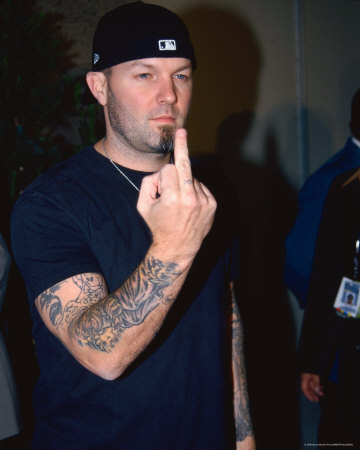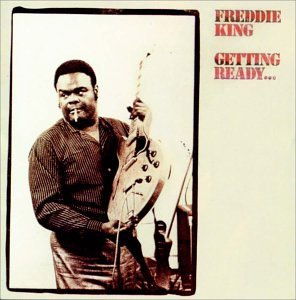Like Louie Armstrong
Played the trumpet
I'll hit dat bong and break ya off something soon
I got to get my props
Cops
Come and try to snatch my crops
These pigs wanna blow my house down
Insane in the membrane
Insane in the brain!
So how did you like part one of Linda's Limp Bizkit concert saga? Quite a little surprise at the end, wasn't there? But fortunately, everything came out all right, didn't it! (Click here if you haven't read part one yet.)
We'll pick up the story where we left off. With no further ado:
| It's Fred Durst, dude! |
After a long nap and very little to drink -- I had learned my lesson -- we drove back to Memorial Hall that night for the show. When I showed the guy at the door my ticket, he asked if I’d like some earplugs. I remember rather haughtily informing him that I’d been to plenty of rock concerts and could handle it. [Editor's note: click here to read about one of the concerts "Linda" had attended many years earlier.] Once I walked in and looked at the stage, I knew I’d probably made a big mistake in refusing the earplugs.
There was literally a wall of Marshalls stacked to the ceiling across the entire width of the stage. [Editor's note: Marshall is a famous British manufacturer of guitar amplifiers and speakers. One of the company's early customers was the Who. Pete Townshend said he used Marshalls so he could be heard over bassist John Entwhistle, who used Marshalls so he could be heard over drummer Keith Moon.]
| Stacked Marshall speaker cabinets |
The front of the stage was screened off by a 20 foot chain-link fence. I later read that Fred had stolen the fence idea from a Ministry show he’d attended. He thought it was a cool way for the fans to get close to him without having to worry about being hurt by them.
The floor seats had been removed to accommodate the mosh pit. No, I did not head for the mosh pit, nor did I allow my son in there, either. Instead, we found good seats at one side of the floor with a great view of the stage.
| It's B-Real, dude! |
The mosh pit was full of thrashing bodies – not surprisingly, almost all teenage males. I never felt threatened or even uneasy, but I was very happy to be sitting at the side of the floor area. The kids in the pit did get more and more, shall we say, enthusiastic as the concert went on. There were a few shoving matches but those were quickly squelched by the security personnel.
When Cyprus Hill finished their set, the lights came up and the curtain went down so the roadies could set up for Limp Bizkit.
A sweet-faced young man of about 18 was sitting on the other side of my son. He proceeded to take out a joint, light it up and smoke it. After a minute or two, it was if he suddenly remembered his manners and he graciously offered it to my son. My son just shook his head. I wanted to yell at this kid, “Excuse me, I know my son is 6 feet tall and wears a size 13 shoe, but he’s only 14! And, oh, by the way, did you not notice that HIS MOTHER is sitting right beside him, YOU MORON?!?”
| That mosh pit is gnarly, dude! |
About 15 seconds into the first song, I was completely regretting my decision to refuse the earplugs. I had been to many, many concerts and feeling the beat of the music physically assault your body was always an integral part of the concert experience. But this. . .this was eardrum-shattering, blood-pouring-out-of-your-head (figuratively, thank goodness!) LOUD.
By now, I was feeling extremely guilty about exposing my child to all the drug use, the profanity and the possible permanent hearing loss. After all, parents are supposed to protect their children from the bad stuff in life and here I had willingly taken him right into this.
As it turned out, Limp Bizkit caused no undue harm to my son. His exposure to Fred Durst and his music didn’t result in a life of drug addiction or depravity.
On the other hand, I was nearly stone deaf for three days after the concert and to this day, still have a lingering fear of drinking too much coffee before getting into a car.
Thanks for a great post, Linda -- I'm looking forward to your next one. And if you run out of good concert stories, just make up some more. At least half my stuff is made up. Like my hot (age-adjusted) French girlfriend, for example. (You never know who's reading this thing, do you?)
Here's the official "Insane in the Brain" video, which was a #1 rap hit for Cypress Hill in 1993, and which crossed over to the Billboard Hot 100 chart, where it reached #19. I find it an absolutely irresistible song:
Here's the official "Insane in the Brain" video, which was a #1 rap hit for Cypress Hill in 1993, and which crossed over to the Billboard Hot 100 chart, where it reached #19. I find it an absolutely irresistible song:
Here's a link to use to buy the song from Amazon:














